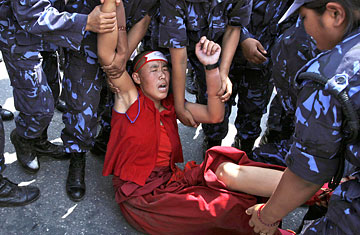
Nepalese police officers detain a Tibetan nun protesting in front of the Chinese embassy in Kathmandu, Nepal, on June 3
Until the devastating May 12 earthquake in China's Sichuan province, the attention of most China watchers had been focused on a completely different part of the country: Tibet. After bloody anti-Chinese protests in mid-March were suppressed by the Chinese military, Beijing closed the Himalayan region off from the outside world and made scores of arrests. Those moves brought widespread international condemnation, which in turn sparked a nationalistic backlash in China that some feared might imperil the smooth running of the Beijing Olympics this August.
But since the quake, in which nearly 100,000 were killed and millions left homeless, global attention—and sympathy—has shifted decisively away from Tibet to China. Indeed, some observers say support in Western capitals for the exiled Tibetan spiritual leader, the Dalai Lama, has lessened noticeably since the quake. They fear the shift is an opportunity for China to harden its position, setting off a new round of tension and violence.
Those concerns were heightened in recent days when Beijing, citing the Sichuan earthquake, postponed a scheduled June 11 meeting between its representatives and those of the Tibetan government-in-exile in Dharamsala, India. The meeting, set before the earthquake, would have marked the resumption of talks suspended in 2006, and thus was widely seen as an encouraging sign that rapprochement was possible.
If China does harden its stance or take other actions that threaten the talks, it will significantly increase the risk of renewed protests in Tibet, says a go-between, one of several informal intermediaries between the Tibetan government-in-exile and Beijing. "If the talks collapse without result, the Dalai Lama won't be able to control the young radicals who want to take more forceful action and say he has been too accommodating," he says.
He and others familiar with the negotiations say the Dalai Lama's government-in-exile is under enormous pressure to produce results or risk losing authority over exile groups like the Tibetan Youth Congress, which advocates a more militant approach. Without some tangible proof that the Dalai's self-proclaimed "third way" is working—including, for instance, an invitation for him to meet with Chinese President Hu Jintao—frustration could also erupt in Tibet itself, they warn. The Dalai Lama himself has expressed this fear. If the talks break down, "demonstrations I think will happen," he told the French news service AFP in late May. "Serious demonstrations—not only demonstrations, but also involving violence."
In fact, some analysts argue that fresh protests could break out as early as this weekend, when the Olympic torch relay passes through the Tibetan capital Lhasa, a route some protesters have claimed was a deliberate provocation. In an apparent concession, Beijing shortened the time that the torch would be present in Tibet but refused to cancel the leg entirely.
One result of the earthquake is that Beijing, which already held most of the cards in negotiations with the Dalai Lama, has gained an even stronger hand, the go-between says. He points out that the Dalai Lama has made enormous efforts to comply with Beijing's demands in an attempt to ensure that there is no excuse to sink the talks. In early June, for example, the Dalai Lama pointedly reaffirmed his conciliatory stance on issues the Chinese consider critical if the talks are to succeed. According to reports in the Beijing-leaning South China Morning Post, Chinese officials have received a document containing the Dalai Lama's statement of support for China's right to hold the Olympics, his denial that he advocates independence, and a condemnation of any use of violence.
In another attempt to publicly demonstrate goodwill, the entire government-in-exile led by the Dalai Lama participated in lengthy prayers for victims of the Sichuan earthquake on June 4. "The Dalai wants to be invited back, but he wants to walk back in, not crawl," says the go-between. "He is already in serious danger of losing control to the radicals. He has to have something to show the Tibetan people. He has bent over backward, but it's all up to Beijing now. There's no more he can do."
